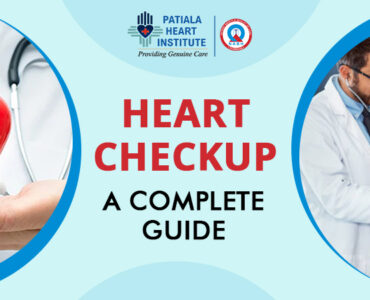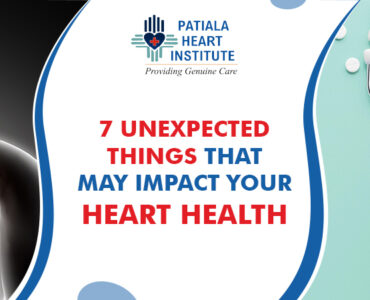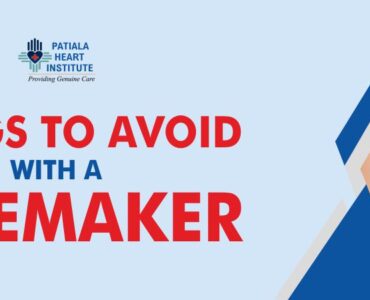According to the Centers for Disease Control and Prevention, 1 in every 500 adults worldwide may have cardiomyopathy.
Cardiomyopathy is a serious condition affecting millions of people worldwide, and understanding the condition, its types, causes, symptoms, and treatment options can help patients better manage their condition by seeking timely medical care.
What is Cardiomyopathy?
Cardiomyopathy is a progressive heart disease that affects the myocardium of the heart or heart muscles. In cardiomyopathy, the heart muscle may thicken, stiffen, thin out, or enlarge, weakening the heart.
As a result, the heart is unable to pump blood properly to the rest of the body and cannot maintain a normal electrical rhythm. This can lead to arrhythmias or irregular heartbeat, heart failure, heart valve problems, and other complications.
What are the Types of Cardiomyopathy
Cardiomyopathy is generally categorized into four different types:
Dilated Cardiomyopathy (DCM)
It is the most common type of cardiomyopathy, in which one of the ventricles or the pumping chambers of the heart gets enlarged or dilated. The weakened ventricles don’t pump well, making the heart work harder. This type of cardiomyopathy may be inherited or acquired due to coronary artery disease.
Hypertrophic cardiomyopathy
In Hypertrophic cardiomyopathy, the heart walls thicken, preventing the blood from flowing through the heart. A person with hypertrophic cardiomyopathy may not experience any symptoms. It is generally an inherited condition, but in some cases, conditions like long-term hypertension, diabetes, and aging can cause acquired-type hypertrophic cardiomyopathy.
Arrhythmogenic right ventricular dysplasia (ARVD)
It is a rare type of cardiomyopathy that occurs when fatty and scarred tissue replaces the muscle tissue in the right ventricle, leading to arrhythmias and other complications. ARVD is a genetic condition and is one of the leading causes of sudden death in young athletes.
Restrictive Cardiomyopathy
During this condition, the heart muscle becomes stiff and less flexible, preventing it from expanding and filling with blood between beats. Among the least common forms of cardiomyopathy, this one most often affects older people. Heart disease, cardiac amyloid, hemochromatosis, scarring of the heart, and other conditions can cause restrictive cardiomyopathy.
Other types of Cardiomyopathy include:
- Broken heart syndrome, or Takotsubo cardiomyopathy, is a stress-induced condition caused by a sudden emotional or physical stressor. It is often a temporary condition and causes temporary heart enlargement.
- Alcoholic cardiomyopathy is caused by drinking excessive alcohol for a long period, causing the heart to weaken and enlarge.
- Transthyretin amyloid cardiomyopathy is a condition in which abnormal protein builds up in the heart’s left ventricle.
- Peripartum cardiomyopathy occurs during or after pregnancy. This rare cardiomyopathy occurs during the final month of pregnancy or within the first five months of delivery.
- Ischemic cardiomyopathy occurs when the heart cannot pump blood to the rest of the body due to coronary artery disease.
- Chemotherapy-induced cardiomyopathy occurs due to damage to the heart muscles from chemotherapy treatments.
What are the Symptoms of Cardiomyopathy?
Symptoms of cardiomyopathy are similar regardless of the type since, in all the conditions, the heart cannot pump enough blood to other organs. Some common cardiomyopathy symptoms include
- Chest pain
- Shortness of breath, especially during exercise or exertion
- Fatigue
- Lightheadedness or dizziness
- High blood pressure
- Heart palpitations or rapid heartbeat
- Fainting
- Edena or swelling in legs, feet, ankles, and other parts of the body
- Coughing when lying down
- Bloating of the abdomen
However, some people may never experience any signs or symptoms while others may not experience signs and symptoms of cardiomyopathy in the early stages, but signs may show gradually as the disease progresses.
What Causes Cardiomyopathy?
Often, the causes of cardiomyopathy are unknown. In other cases, cardiomyopathy can be inherited or acquired. Inherited means that the person may be born with cardiomyopathy due to genes inherited from parents.
Acquired means a person may develop cardiomyopathy due to other health conditions or diseases. Some factors or health conditions that can increase the risk of cardiomyopathy include
- Coronary artery disease
- Autoimmune diseases like connective tissue diseases
- Aging
- Diabetes
- Long-term hypertension
- Excessive alcohol consumption for long-term
- Muscle conditions such as muscle dystrophy
- Heart inflammation from myocarditis, endocarditis, or pericarditis
- Diseases that cause a build-up of substances in the heart, such as amyloidosis and sarcoidosis
How is Cardiomyopathy Treated?
A person with cardiomyopathy without symptoms may not need any treatment until symptoms appear. The treatment of cardiomyopathy will vary depending on the type of cardiomyopathy and the damage caused to the heart due to the condition. However, treatment cannot cure or reverse cardiomyopathy but can only manage it or slow its progression.
Cardiomyopathy treatment aims to manage the signs and symptoms, prevent the condition from worsening, manage conditions that caused cardiomyopathy, and reduce the risk of complications. Treatment will include lifestyle changes, cardiomyopathy medications, procedures, and devices.
Lifestyle Changes
Making heart-healthy lifestyle changes can help manage the signs and symptoms of cardiomyopathy. These may include:
- Eating heart-healthy diet
- Managing stress
- Exercising regularly
- Reducing alcohol intake
- Quitting smoking
To get started with a heart-healthy diet, you can read our blog: Importance of Diet for a Healthy Heart
Medication
Different types of medications are used for managing symptoms and treating cardiomyopathy. These may include
- Blood thinners or anticoagulants to prevent the formation of blood clots
- Beta-blockers to treat conditions like high blood pressure and irregular heartbeats.
- Diuretics to reduce fluid buildup
- Angiotensin Converting Enzyme (ACE) inhibitors to relax your blood vessels and ease the pumping of blood
- Medicines to balance electrolyte levels
Implanting Device
Your cardiologist may suggest implanting heart-assist devices to help manage symptoms and improve the heart’s functioning in cardiomyopathy patients.
- Devices to improve blood flow: Cardiac resynchronization therapy (CRT) device to regulate heart contractions. The device controls the contraction between the heart’s left and right sides. A left ventricular assist device (LVAD) helps the heart pump blood effectively.
- Devices to control arrhythmias: Devices like pacemakers and defibrillators help regulate irregular heart rhythms. These devices monitor the heartbeat and send electrical impulses to the heart when arrhythmias are detected.
Surgeries
Cardiologists may recommend heart surgery if the symptoms of cardiomyopathy are severe and medication doesn’t bring effective results. These surgeries may include:
- Septal myectomy: The surgery includes removing some heart tissues to improve blood flow
- Septal ablation: A catheter is guided to the affected artery to inject alcohol into it to reduce muscle size. This allows the blood to flow normally through the area.
- Heart transplant: If other procedures are ineffective, the cardiologist may recommend a heart transplant.
If you or a loved one are experiencing symptoms of cardiomyopathy or have been diagnosed with the condition, don’t hesitate to seek medical attention. Our well-equipped cath lab and expert care allow us to diagnose and treat all types of cardiomyopathy at Patiala Heart Institute.
Our multidisciplinary team of highly skilled cardiologists and healthcare professionals is dedicated to helping patients achieve the best possible outcomes and quality of life. Contact us today to schedule a consultation and learn more about how we can help you manage your cardiomyopathy.
Can Cardiomyopathy Be Prevented?
Most types of cardiomyopathy are inherited and cannot be prevented. However, you can make some lifestyle changes to keep your heart healthy and reduce the risk and impact of cardiomyopathy. Here are a few steps you can take to lower the risk of cardiomyopathy:
- Exercising regularly
- Eating heart-healthy diet
- Reducing stress levels
- Managing underlying health conditions
- Reducing alcohol intake and quitting smoking
Can Stress Cause Cardiomyopathy?
Yes, excessive stress can cause cardiomyopathy in some cases. This type of cardiomyopathy is called stress-induced or Takotsubo cardiomyopathy and is triggered by sudden emotional or physical stress.







